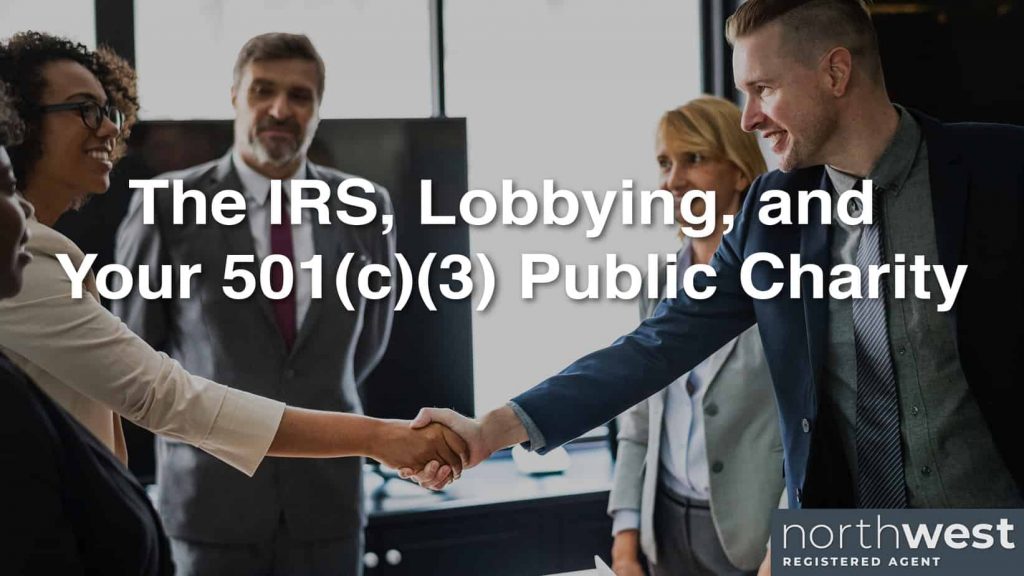The IRS, Lobbying, And Your 501(C)(3) Public Charity
It isn’t illegal for a 501(c)(3) public charities to try to influence legislation relevant to its charitable goals, so long as lobbying doesn’t make up a substantial part of the organization’s activities, and so long as the organization doesn’t support or oppose a candidate for political office. The trick is to get clear about what does and doesn’t count as lobbying in the eyes of the IRS, and to make sure that lobbying remains an insubstantial part of your 501(c)(3) organization’s overall activities.
It’s important to note, however, that 501(c)(3) private foundations, with a few exceptions, are restricted entirely from trying to influence legislation either directly or through the general public. The lobbying possibilities briefly explored in this article apply only to 501(c)(3) public charities.
Lobbying According to the IRS
The IRS defines lobbying as any attempt by an organization to advocate for or against specific legislation by contacting legislators (or their employees) or by urging the general public to do so by issuing a call to action. Importantly, lobbying always involves an expression of the organization’s point of view about that specific legislation. Simply educating legislators or the general public about an issue or a piece of legislation, or presenting impartial research on a subject relevant to your nonprofit’s charitable goals, doesn’t count as lobbying.
These distinctions matter because pretty much every 501(c)(3) public charity is constantly involved in issue advocacy of some kind, and yet only a narrow slice of those activities are likely to qualify as lobbying in the eyes of the IRS. If your 501(c)(3) charity focuses on securing low-income housing for homeless veterans in your city, for instance, it isn’t lobbying to publish annual statistics relevant to the social problem your organization seeks to redress, and it isn’t lobbying to advocate generally for the welfare of the people your organization serves. That’s called doing your job. To the extent that such activities influence legislation, they do so indirectly (perhaps by opening a politician’s eyes to the nature and extent of the problem), but they do not constitute lobbying activities as defined by the IRS.
It’s the extra step—the reaching out to legislators or their employees to influence specific legislation (or encouraging the public to do so through a call to action)—that transforms basic advocacy into lobbying. And, indeed, this reaching out must be tied to specific legislation. Contacting a state representative to garner general support for your nonprofit’s charitable purposes isn’t lobbying either if no specific legislation is at issue.
In general, the IRS distinguishes between direct lobbying (as when your organization’s members and volunteers reach out to policymakers to influence specific legislation) and grass roots lobbying, which refers to when your 501(c)(3) organization encourages the general public to do the same.
How Much Lobbying Is Too Much for a 501(c)(3) Organization?
The IRS restricts a 501(c)(3) public charity’s lobbying activities to an “insubstantial” part of its total activities, and it provides two ways to measure your nonprofit’s lobbying limits: the “substantial part test” and the “expenditure test.” Your organization can elect to have its lobbying efforts measured by the expenditure test, which we’ll discuss below, but in the absence of this election the IRS will use the substantial part test instead.
The trouble, however, is that the substantial part test is itself somewhat insubstantial. The IRS hasn’t clearly defined what “substantial” lobbying means and hence judges each nonprofit individually based on “all the pertinent facts and circumstances,” such as how much time your nonprofit’s employees and volunteers devote to lobbying and the amount your organization spends.
Sound confusing? It should. If your nonprofit barely devotes any of its time and money to lobbying (say, 5% of its annual income), you likely have nothing to fear from the rather subjective (and potentially arbitrary) substantial part test. If lobbying makes up a more substantial (but still insubstantial!) part of your activities, however, the solid numbers provided by the expenditure test will probably serve you better. When you’re dealing with the IRS, after all, guesswork is never a good idea.
The expenditure test is simply far more specific than the substantial part test. Smaller nonprofits with $500,000 or less in total annual exempt expenditures, for instance, can usually spend up to 20% of their budgets to support lobbying efforts, though the numbers change for nonprofits with higher annual revenues (with the highest allowable lobbying expenses capped at one million dollars for the wealthiest organizations). The important thing, though, is that the expenditure test provides clear accounting guidelines for your nonprofit to follow.
To have your 501(c)(3) public charity’s lobbying efforts measured by the expenditure test, however, you’ll need to file Form 5768—a document with the forbidding name Election/Revocation of Election by an Eligible IRC Section 501(c)(3) Organization to Make Expenditures to Influence Legislation. Filing Form 5768 allows your 501(c)(3) public charity to take the 501(h) election, which is just another way of saying that your nonprofit elects to have its lobbying activities measured by the amount of money it actually spends.
Some Important Restrictions
If your 501(c)(3) public charity decides to include lobbying as part of its other activities, it’s crucial to make sure every attempt to influence legislation reflects the tax-exempt purposes identified in your nonprofit’s Application for Recognition of Exemption (Form 1023 or 1023-EZ) already filed with the IRS. If it doesn’t, your organization could face severe tax penalties even if your lobbying efforts otherwise satisfy the IRS lobbying rules. So if your organization wishes to pursue tax-exempt purposes not previously identified to the IRS, make sure to officially amend your statement of purpose before pursuing your organization’s new ambitions.
Your 501(c)(3) public charity should also avoid supporting or opposing political candidates and taking part, directly or indirectly, in any political campaign. The IRS restriction against 501(c)(3)s participating in political campaigns is absolute.
